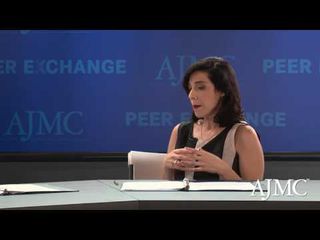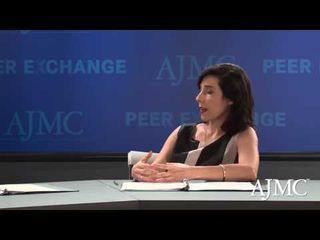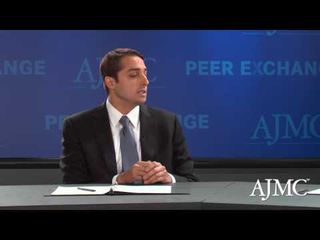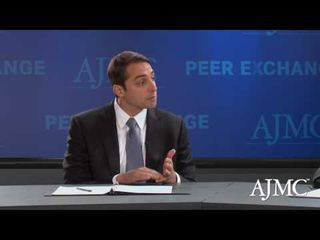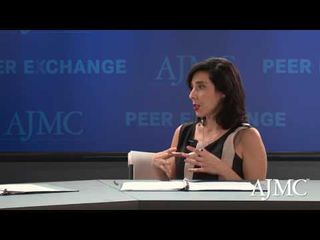
Oncology
Latest News
Latest Videos

More News

This week, the top managed care stories included final enrollment numbers for the Affordable Care Act for 2017, a report that revealed low rates of lung cancer screening, and a study found that a population-based weight management strategies can prevent diabetes.

Does an FDA approval guarantee clinical benefit of a drug? How does it influence drug price?

Analysis of the liquid used to make the aerosol in e-cigarettes has led to the discovery of high levels of 5 potentially toxic heavy metals.

A long-term health study has found that seniors with a higher body mass index were less likely to make use of hospice care. Additionally, obese seniors spent significantly fewer days in hospice care than their nonobese counterparts.

A recent JAMA study found that women with breast cancer would generally like to receive genetic testing and counseling, but less than one-third actually receive it.

The Health Care Working Group of the Personalized Medicine Coalition (PMC) has published a new report that provides a framework for the successful integration of personalized medicine in the clinic.

Women with breast cancer are twice as likely to return to work after treatment if their employer makes accommodations for them, but workplace accommodation and job retention are significantly lower for low-income and minority women.

Lung cancer screening rates in the United States remained low and unchanged in 2015 despite recommendations that high-risk current and former smokers be screened.

The FDA has been willing to explore the utilization of surrogate endpoints like tumor response in clinical trials, but it is unclear whether these endpoints correlate with overall survival, said David Fabrizio of Foundation Medicine, Inc. However, he emphasized that overall survival does not necessarily benefit the patient if the additional days gained are not quality days.

Cancer Outcomes Tracking and Analytics (COTA) focuses on stratifying cancer patients by their many subtypes to understand the different treatments, outcomes, and costs for each, according to Stuart Goldberg, MD, chief medical officer, COTA, John Theurer Cancer Center.

A white paper commissioned by the Community Oncology Alliance (COA) delved into the practice of “direct and indirect remuneration” fees administered by pharmacy benefit managers and how they could drive up drug prices for Medicare Part D beneficiaries and taxpayers.

Pembrolizumab (Keytruda) has received green light from the European Commission for the first-line treatment of a select population of adult patients with metastatic non-small cell lung cancer.

During the National Cancer Prevention Month, there will be renewed fervor among healthcare providers to ensure individuals pay greater attention toward preventive measures against cancer.

The criteria to enroll cancer patients in a clinical trial of CAR-T cells vary according to their disease, past therapy, and how far along they are in different treatments, said David L. Porter, MD, of the University of Pennsylvania Health System.

A multicollaborative study has identified gaps in existing quality measures used by accountable care programs that could result in missed opportunities to improve patient outcomes.

Patient-centered medical homes are valuable because they allow insurers to look at the cost of all of the patient’s treatments, services, and physicians throughout the continuum of care, explained Kim Eason, manager at Horizon Blue Cross Blue Shield of NJ.

The American College of Cardiology is set to hold its annual meeting in the nation's capital March 17-20, 2017.

A retrospective analysis of evidence from prescription data gathered in Belgium and Italy has found that uncontrolled diabetes might be an early sign of pancreatic cancer.

A review of 2013 cancer statistics in the United States by the CDC showed that 67% of people survived at least 5 years after their cancer diagnosis.

Technological advances in cancer care have changed the very process of treatment, as now oncologists can gain more insight into the most effective therapy for each individual patient, according to Joseph Alvarnas, MD, of the City of Hope and editor-in-chief of Evidence-Based Oncology.

This week, the top managed care stories included Aetna and Humana's merger getting blocked, the first Affordable Care Act replacement proposal was unveiled, and an analysis of regional cancer death trends.

Patients who have had at least 1 prior therapy or carry a 17p deletion or TP53 mutation are now eligible to be treated with ibrutinib (Imbruvica) in the United Kingdom.

The most transformative software companies are those that have seized the opportunity to incorporate clinician and patient voices into the design of their health IT tools, according to Carrie Stricker, PhD, RN, AOCN, chief clinical officer and co-founder of Carevive.

The American Journal of Managed Care® presents its annual special issue of Evidence-Based Oncologyâ„¢ featuring full coverage of the 58th annual meeting of the American Society of Hematology. CAR T-cell treatments gained notice, as did sessions on patients’ improving quality of life and addressing the high costs of new therapies.

“Off-the-shelf” chimeric antigen receptor (CAR)-T cells, also known as universal donor cells, were used in 2 young infants with relapsed, refractory acute lymphoblastic leukemia resulted in molecular remission in 28 days in both infants.


